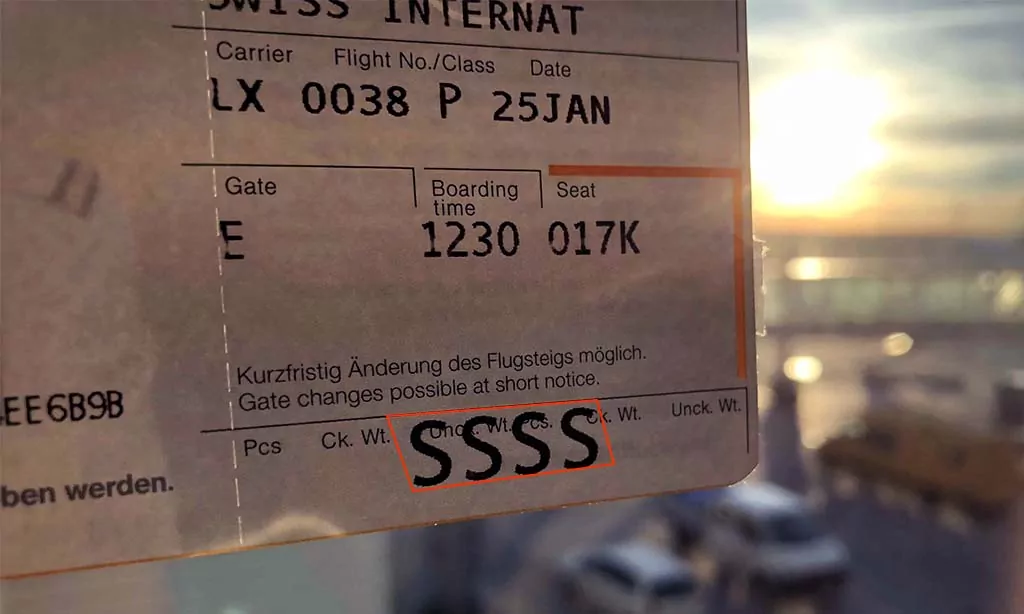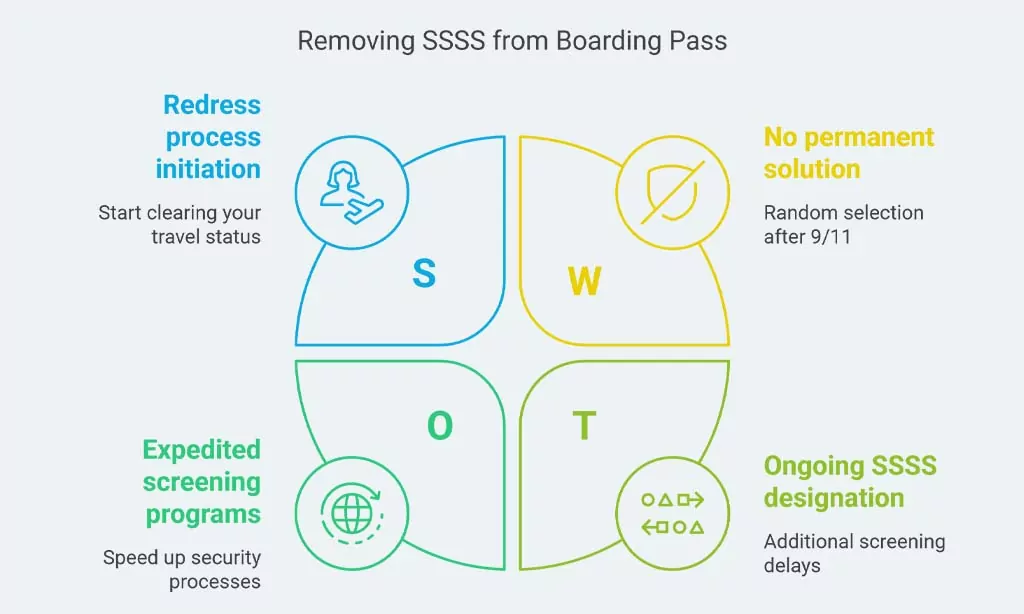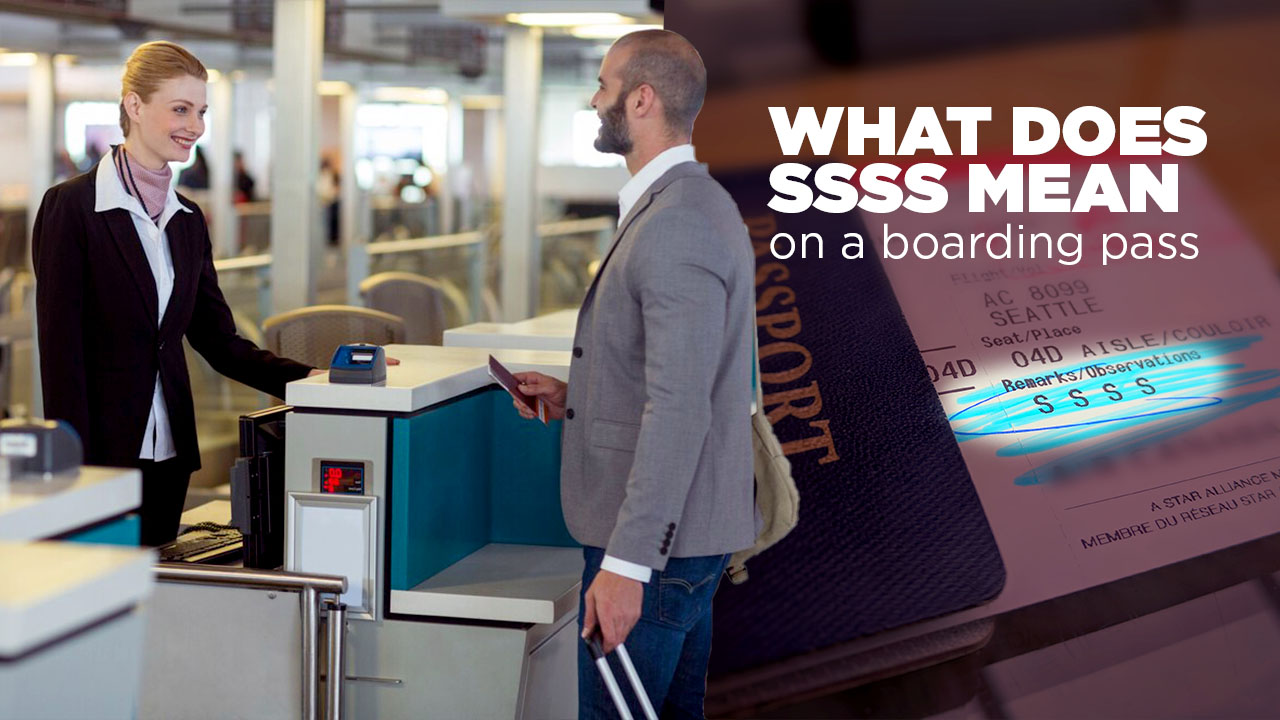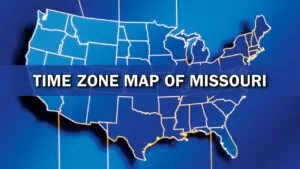Have you ever found “SSSS” on your boarding pass and wondered what it means? This code can puzzle many travelers, raising questions about their upcoming flight. The acronym SSSS stands for Secondary Security Screening Selection.
It’s a marker set by the U.S. Department of Homeland Security that signals additional security checks are needed.
This blog post will explain why SSSS appears on some boarding passes and not others, delve into the screening process, and offer advice on how to handle being selected. Knowing what does SSSS mean on a boarding pass can make your travel smoother.
Keep reading to learn more about this important airport security measure.
Key Takeaways
- SSSS stands for “Secondary Security Screening Selection.” The U.S. Department of Homeland Security uses it to mark passengers who need extra checks.
- Reasons for getting SSSS include random selection, specific travel patterns, destinations with higher security risks, and last-minute ticket purchases.
- During the screening process, expect additional ID checks, baggage inspections, and possibly longer wait times at the airport. This applies to both domestic and international flights.
- To potentially remove SSSS from your boarding pass in the future, engage in the TSA’s redress process and consider applying for expedited screening programs like Global Entry or TSA PreCheck.
- Arriving early at the airport and following all TSA guidelines can ease the experience if selected for secondary screening.
What is SSSS on a Boarding Pass?

SSSS on a boarding pass stands for “Secondary Security Screening Selection.” This label indicates that the passenger must undergo extra security checks before boarding their flight.
Meaning of the acronym
SSSS stands for “Secondary Security Screening Selection.” The U.S. Department of Homeland Security uses this acronym to mark boarding passes for travelers who need additional checks.
This selection process started after 9/11 as a security measure to ensure passenger safety.
Travelers may find SSSS on their boarding pass when they are randomly selected for extra screening. This designation alerts airport security measures that more scrutiny is required before boarding the flight.
Such protocols help enhance the overall security screening process at airports, especially during international flights.
Purpose of SSSS designation
SSSS stands for “Secondary Security Screening Selection” by the U.S. Department of Homeland Security. This designation appears on boarding passes to indicate that a passenger has been chosen for additional security checks.
The purpose of SSSS is to enhance flight safety and ensure secure travel environments. After 9/11, this screening process began as a vital measure in airport security.
The Transportation Security Administration (TSA) uses SSSS primarily for random selection or specific criteria related to boarding pass screening. Travelers with an SSSS designation will undergo extra security measures before boarding their flights.
This process might lead to longer wait times at the airport, particularly for international flights where security comes into play more rigorously. Understanding the purpose behind this designation can help travelers prepare better for their journeys through enhanced security protocols.
Reasons for Receiving SSSS on a Boarding Pass
Some factors can trigger the SSSS designation on your boarding pass. These may include travel patterns, ticket purchasing habits, or even random selection by security measures.
Possible triggers
SSSS on a boarding pass indicates that the passenger has been selected for extra screening. Various factors can lead to this designation.
- Random selection occurs during the security clearance process. The Transportation Security Administration (TSA) uses this method to enhance airline security.
- Identifying specific travel patterns can trigger SSSS on a boarding pass. Frequent international flights may raise flags within the system.
- A traveler’s identity history might influence the decision for secondary screening selection. Previous security incidents may impact future travels.
- Specific destinations might also play a role in receiving SSSS designation. Flights to countries with higher security risks often require additional measures.
- Passenger behavior at check-in or security checkpoints can attract attention. Anxious movements or unusual responses may lead to further scrutiny.
- Certain types of baggage and items could result in an SSSS indication on your boarding pass. Unusual luggage contents might prompt more careful inspections.
- Flying without any prior TSA PreCheck or Global Entry status often leads to SSSS designations for travelers who do not have established security clearances.
- Last-minute ticket purchases could signal potential risk factors, prompting random selection for additional checks during the airport screening process.
Other factors that may contribute
Travelers may face SSSS on a boarding pass for various reasons. Random selection plays a significant role in the process. The Transportation Security Administration (TSA) uses this method to enhance security measures post-9/11.
Certain behaviors or patterns can also trigger this additional screening. For example, changing airports frequently or purchasing one-way tickets might raise flags during the security selection process.
Some travelers wonder if holding Global Entry or TSA PreCheck offers any protection from receiving SSSS on their boarding passes. Unfortunately, these programs do not guarantee exemption from secondary screening checks at airports.
Intense scrutiny remains crucial for both domestic and international flight security, ensuring passenger safety through comprehensive identities verification and customs inspection processes.
What to Expect During the SSSS Screening Process
During the SSSS screening process, expect extra checks at security. Agents will ask for identification and may conduct thorough baggage inspections.
Domestic flights
SSSS on a boarding pass can cause delays for domestic flights. This designation signals that a traveler must undergo extra security screenings. The Transportation Security Administration (TSA) randomly selects passengers after September 11, 2001, as part of increased security measures.
Travelers may experience longer wait times at the airport due to these additional checks.
Receiving SSSS does not guarantee exemption from screening even if you have Global Entry or TSA PreCheck. It will still require identification and custom inspection during your airport visit.
Many travelers find this process frustrating, but it maintains current safety protocols in air travel.
International travel
Travelers may see SSSS on their boarding pass for international flights. This designation indicates that they will undergo extra security checks before boarding. The Transportation Security Administration (TSA) enforces these measures to enhance safety after the events of 9/11.
Receiving SSSS can lead to longer wait times at the airport. Travelers should prepare for this additional screening process when flying internationally. Global Entry or TSA PreCheck does not guarantee exemption from receiving SSSS on a boarding pass, as selection occurs randomly or based on specific criteria.
How to Remove SSSS from Your Boarding Pass

To remove SSSS from your boarding pass, start the redress process with the Transportation Security Administration (TSA). Gather necessary documents and submit them for review to help clear your status.
Redress process
The redress process helps travelers address issues related to SSSS on a boarding pass. Passengers can take steps to minimize future problems during security screenings.
- Fill out the Redress Control Process form. This form allows you to report any travel-related issues to the Transportation Security Administration (TSA).
- Submit your application online through the TSA’s website. Include accurate and complete information for better processing.
- Wait for a response from the TSA. Processing typically takes several weeks, so be patient after submission.
- Check if you qualify for expedited screening programs like Global Entry or TSA PreCheck. These may not exempt you from SSSS but can speed up other security processes.
- Keep documentation of your travels and any prior SSSS designations. This information may help explain your situation in future interactions with airport authorities.
- Contact your airline if you frequently receive SSSS designations without clear reasons. They might offer assistance or advice based on your flying history.
- Adapt travel plans accordingly if SSSS becomes an ongoing issue. Arriving at the airport early can ease stress caused by additional screening delays.
- Follow all TSA guidelines during screenings, even if selected for SSSS again. Compliance may reduce frustrations at security checkpoints.
- Stay informed about changes in TSA policies regarding SSSS and boarding passes as they occur over time.
- Understand that there are no permanent solutions to avoid being marked for SSSS due to its random selection nature after 9/11, impacting many travelers across domestic and international flights alike.
Tips for future travel
Travelers can reduce the chance of getting SSSS on their boarding passes. Following some tips can make your journey smoother.
- Complete all travel documents accurately. Misinformation increases scrutiny during security checks. Double-check names, dates, and flight details before booking.
- Keep your travel history clean. Frequent trips to certain countries or regions may flag your profile for SSSS selection. Avoid flagged destinations if possible.
- Use a reliable airline for frequent travel. Airlines with strong security protocols might help minimize the chances of being selected for extra screening.
- Apply for Global Entry or TSA PreCheck. These programs do not guarantee exemption from SSSS but often speed up other security processes.
- Arrive early at the airport. Prepare to spend extra time at security if you see SSSS on your boarding pass. Longer wait times usually occur due to additional screenings.
- Stay calm during security checks. Cooperate fully with TSA agents during the Secondary Security Screening process to ensure a smooth experience.
- Carry essential documents easily accessible. Keep IDs, boarding passes, and any necessary forms handy for quicker processing during screenings.
- Pack wisely for easier screening procedures. Place items like laptops and liquids in easy-to-reach areas of your bag to expedite inspections.
- Review recent travel experiences online and learn from others’ insights about navigating SSSS challenges effectively before future trips.
- Familiarize yourself with airport layouts beforehand, especially if flying internationally where additional security is common with SSSS on a boarding pass.
Takeaways
Understanding SSSS on a boarding pass can relieve some travel anxiety. This designation means you will face extra security checks. Many factors can trigger this selection, but it is often random.
Expect longer wait times at the airport when you see SSSS. Stay informed to make your travel experience smoother next time.
FAQs
1. What does SSSS mean on a boarding pass?
SSSS stands for Secondary Security Screening Selection on a boarding pass. It’s a signal by the Transportation Security Administration (TSA) that you need additional security checks.
2. Why would I see SSSS on my boarding pass?
The TSA might mark your boarding pass with SSSS if they select you randomly or if something about your travel pattern raises a flag in their system.
3. Does getting an SSSS mean there is something wrong?
No, getting an SSSS doesn’t imply wrongdoing. It merely means the TSA has chosen you for extra security screening before your flight.
4. Is there any way to avoid getting an SSSS on my boarding pass?
There isn’t a surefire way to avoid it as selections can be random. However, joining trusted traveler programs like Global Entry may reduce the chances of receiving an SSSS.





























